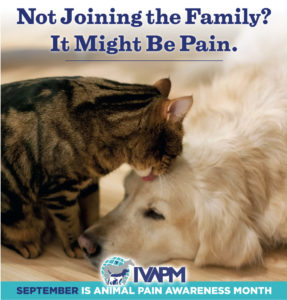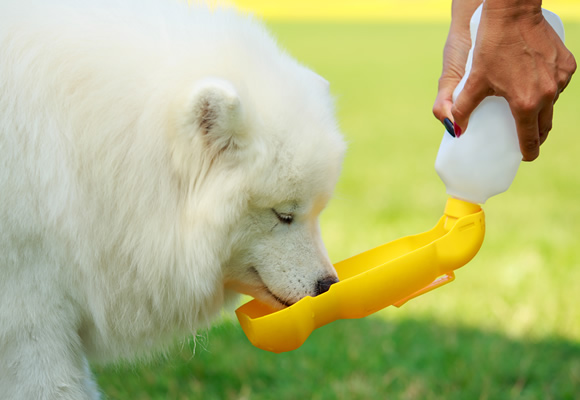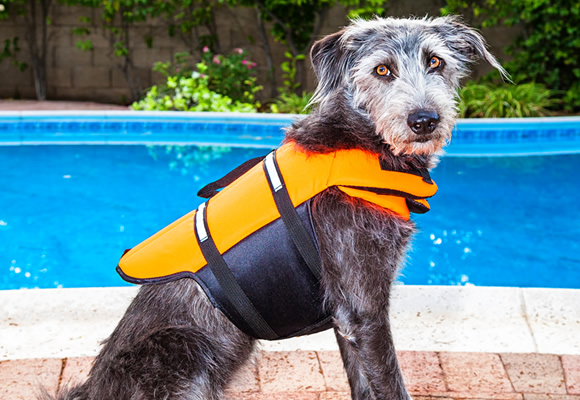
After months of working in your pajamas, it’s easy to forget “fashion BC” (Before COVID). It might be just as hard for your pet to remember his or her “manners BC” for the holidays.
Joyous Jumpers
Let’s face it – your heart is jumping for joy to see a long-lost loved one. Will Fido remember them too? Behavior research suggests yes. While dogs don’t excel at traditional long-term memory, they do possess “associative” memory. A pro-social dog with a fond association of your guests might forget the “no jumping” rule.
“A behavior has to be a very well rehearsed with broad contextual understanding in order for your dog to recall it in moments of excitement,” said Kristi Swan, Certified Professional Trainer and owner of A Dog’s Life. “Dogs don’t generalize well.” Read the rest of this entry »


 September is Animal Pain Awareness Month, during which time the International Veterinary Academy of Pain Management educates pet parents on signs of pain in their companion animals. As providers of pet hospice at home, Heaven at Home would like to take this opportunity to help pet parents ensure that their cats and dogs do not suffer needlessly as they age. Our hospice veterinarians are available for Quality of Life
September is Animal Pain Awareness Month, during which time the International Veterinary Academy of Pain Management educates pet parents on signs of pain in their companion animals. As providers of pet hospice at home, Heaven at Home would like to take this opportunity to help pet parents ensure that their cats and dogs do not suffer needlessly as they age. Our hospice veterinarians are available for Quality of Life  For many pet owners, the cause of incontinence in their fur family member can be as simple as a highly treatable UTI (urinary tract infection) or the harbinger of serious disease.
For many pet owners, the cause of incontinence in their fur family member can be as simple as a highly treatable UTI (urinary tract infection) or the harbinger of serious disease. Good hydration is key during the “dog days of summer.” Dogs can become seriously ill – or even die – from losing as little as 10-15% of their body’s water. Dogs need at least an ounce of water per pound of weight daily – more if active. Hot weather makes dogs pant more and sweat through their paws.
Good hydration is key during the “dog days of summer.” Dogs can become seriously ill – or even die – from losing as little as 10-15% of their body’s water. Dogs need at least an ounce of water per pound of weight daily – more if active. Hot weather makes dogs pant more and sweat through their paws. Your loyal companion was there for you during lockdown, entertaining you, relieving your stress, photo-bombing your Zoom meetings… Repay that kindness and nourish your connection even if you’re back in the saddle at work.
Your loyal companion was there for you during lockdown, entertaining you, relieving your stress, photo-bombing your Zoom meetings… Repay that kindness and nourish your connection even if you’re back in the saddle at work.
 Are you confused by reports that grain-free and exotic dog food ingredients may be causing an increased number of dogs to die prematurely of “DCM” (dilated cardiomyopathy)? The stakes are high in the $30 billion petfood market where boutique producers are pitted against mounting evidence from the FDA. It’s hard for pet parents to cut through the spin to get the facts.
Are you confused by reports that grain-free and exotic dog food ingredients may be causing an increased number of dogs to die prematurely of “DCM” (dilated cardiomyopathy)? The stakes are high in the $30 billion petfood market where boutique producers are pitted against mounting evidence from the FDA. It’s hard for pet parents to cut through the spin to get the facts. Pet parents are faced with tough choices when spring wanderlust strikes. Senior dogs and cats truly require more monitoring with advanced age.
Pet parents are faced with tough choices when spring wanderlust strikes. Senior dogs and cats truly require more monitoring with advanced age.